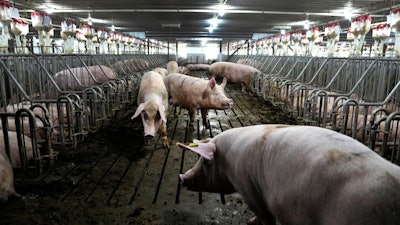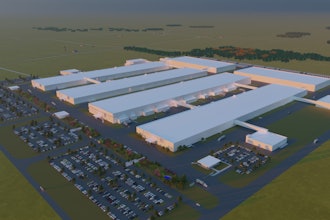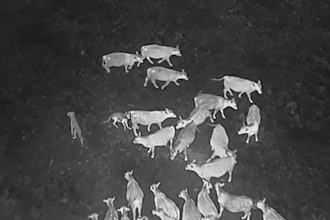
DES MOINES, Iowa (AP) — A California law approved by voters that promises to get breeding pigs out of narrow cages that prevent them from standing or turning will finally take effect Saturday, after years of delays and warnings that the rules could lead to price spikes and pork shortages.
But it will be six months before California grocery shoppers can be sure that pork chops they buy under the new law will be from a pig whose mother wasn't confined in a so-called gestation crate.
That's because while the U.S. Supreme Court upheld the law, the state recently agreed to allow pork slaughtered before July 1 to be sold in California markets and restaurants for the rest of the year. That decision gives farmers and grocery stores time to adjust. But it's exasperating to supporters of the new rules that the effective implementation of the law would again be delayed — four years after voters approved it.
"This development compounds the instability and confusion in the marketplace, while punishing the small independent family farmers and those companies that have been prepared to abide by the law," Chris Oliviero, general manager of meat company Niman Ranch, said in a statement.
Niman stands to benefit from the law because it contracts with farmers that have long met California's new animal welfare rules.
But even backers of the tougher rules recognize a silver lining in the delay: Giving producers, grocers and restaurants more time to adjust will reduce the chance of shortages. Josh Balk, who led the Humane Society of the United States' campaign to pass the law, said "there's going to be a smooth transition for the pork industry."
The measure also included space requirements for egg-laying hens and veal calves. But while those producers complied, the pork industry filed legal challenges. They argued that California, which consumes roughly 13% of the nation's pork but produces almost none of it, shouldn't dictate how farmers mainly in the Midwest and North Carolina should raise hogs.
Californians approved Proposition 12 in 2018, mandating that fresh pork sold in their state had to be born to sows with at least 24 square feet of space, allowing a breeding pig to turn around and extend its limbs. It effectively banned widely used gestation crates that protect sows from other pigs, which can be aggressive, but that many people see as cruel.
Producers argued converting barns to comply would be costly, with standard operations paying $5 million to $15 million, said Michael Formica, a lawyer with the Iowa-based National Pork Producers Council. Larger spaces would also mean higher heating and maintenance costs.
Pork producers also defended their treatment of pigs, arguing the law wasn't based on science.
The Supreme Court upheld the law in a 5-4 ruling, with Justice Neil Gorsuch writing that "While the Constitution addresses many weighty issues, the type of pork chops California merchants may sell is not on that list."
To sell in California, farmers will need to operate more like Jared Schilling, who left a job as a civil engineer in Chicago to join his three siblings in shifting their family farm in southern Illinois away from gestation crates. They moved to group housing for all their breeding pigs as well as the other hogs.
"It's easier to manage an animal if they never move," Schilling said of the crates.
They thought giving the animals extra space would be more humane, but without crates breeding pigs at times fight each other. The family had to add new technology to track each animal and figure out ways to prevent the fighting, on top of the cost of the expensive new barns.
After about five years, the farm now has about 3,600 breeding sows. It sells 80,000 hogs a year to Coleman Natural Foods, a Colorado-based national meat distributor that has sold only crate-free pork since 2018.
Schilling said Coleman pays him about 5%-10% more for the hogs so he can cover his extra expenses. The family's decision to keep animals in much larger pens also paid off in a more relaxed operation for everyone — people as well as pigs.
"When they're in the pens, they're laying down, chill. There's basically no noise," Schilling said. "They definitely feel more relaxed."
The California law, as well as one taking effect soon in Massachusetts, should mean increased demand for pork from Schilling's farm and ultimately more profit.
Some grocery stores in California don't anticipate too much of a disruption, but others are scrambling, even with the latest delay in the regulations, said Ronald Fong, CEO of the California Grocers Association.
Bacon is likely to remain well stocked because it can be frozen. But fresh products could be in shorter supply.
"Pork chops, pork loin, pork roast, that are sold fresh, not frozen, those are the types of products that we can anticipate a disruption at some level," Fong said.
Balk, the humane society campaigner, now heads a company that seeks to influence food companies by investing in them. He believes the California law will speed up the demise of gestation crates. He said some companies already are promising to stop buying pork from operations that use the crates, and it's only a matter of time before they are phased out.
For now, it's unclear how many hog farmers will invest to upgrade pens and meet demand in California and Massachusetts.
"As best we can tell, there's nowhere near enough supply," said Formica, of the pork producers.






















